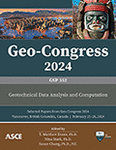Extraction-Induced Deformation in the Gas Hydrate Reservoir Using a Multiphase-Coupled THMC Solver
Publication: Geo-Congress 2024
ABSTRACT
Gas hydrates are ice-like substances found in deep sediments under high pressures and low temperatures, holding substantial natural gas reserves. Extracting gas from these reservoirs faces challenges due to complex interactions between hydrate-bearing sediments, fluid flow, and thermal processes. To address these challenges, a thermo-hydro-mechanical-chemical (THMC) simulator has been developed in this study. This simulator incorporates the change in mechanical (using advanced elastic-plastic models), thermal, and fluid flow characteristics in response to pressure, temperature, and production changes. A numerical solver for the coupled THMC processes in gas hydrate reservoirs has been created using finite volume method (FVM) and finite element method (FEM) approach within the PETSc framework. Using this simulator, the numerical study explores gas extraction using a single horizontal well, considering different reservoir porosity and hydrate saturation scenarios. The analysis reveals that the reservoirs characterized by higher porosity and hydrate saturation exhibit greater cumulative gas production till 30 days. However, the case with higher porosity and lower hydrate saturation experiences the maximum differential settlement after 30 days.
Get full access to this article
View all available purchase options and get full access to this chapter.
REFERENCES
Bai, Y., Li, Q., Zhao, Y., Li, X., and Du, Y. (2009). The experimental and numerical studies on gas production from hydrate reservoir by depressurization. Transport in porous media, 79, 443–468.
Gai, X., and Sánchez, M. (2017). A geomechanical model for gas hydrate-bearing sediments. Environmental Geotechnics, 4(2), 143–156.
Gao, Q., Yin, Z., Zhao, J., Yang, D., and Linga, P. (2021). Tuning the fluid production behaviour of hydrate-bearing sediments by multi-stage depressurization. Chemical Engineering Journal, 406, 127174.
Gupta, S., Deusner, C., Haeckel, M., Helmig, R., and Wohlmuth, B. (2017). Testing a thermo‐chemo‐hydro‐geomechanical model for gas hydrate‐bearing sediments using triaxial compression laboratory experiments. Geochemistry, Geophysics, Geosystems, 18(9), 3419–3437.
Klar, A., and Soga, K. (2005). Coupled deformation-flow analysis for methane hydrate production by depressurized wells. In 3rd International Biot Conference on Poromechanics (pp. 653–659).
Klar, A., Soga, K., and Ng, M. Y. A. (2010). Coupled deformation–flow analysis for methane hydrate extraction. Geotechnique, 60(10), 765–776.
Kim, H. C., Bishnoi, P. R., Heidemann, R. A., and Rizvi, S. S. (1987). Kinetics of methane hydrate decomposition. Chemical engineering science, 42(7), pp.1645–1653.
Kamath, V. A., and Holder, G. D. (1987). Dissociation heat transfer characteristics of methane hydrates. AI Ch. EJ;(United States), 33(2).
Liu, L., Liu, Y., Yao, J., and Huang, Z. (2020). Efficient coupled multiphase-flow and geomechanics modeling of well performance and stress evolution in shale-gas reservoirs considering dynamic fracture properties. SPE Journal, 25(03), 1523–1542.
Moridis, G. J., Collett, T. S., Boswell, R., Kurihara, M., and Reagan, M. T. (2008). Toward production from gas hydrates: Assessment of resources, technology and potential. In SPE unconventional reservoirs conference. OnePetro.
Rutqvist, J., and Moridis, G. J. (2008). Coupled hydrologic, thermal and geomechanical analysis of well bore stability in hydrate-bearing sediments. In Offshore Technology Conference. OnePetro.
Wani, S., Samala, R., Kandasami, R. K., and Chaudhuri, A. (2023a). Numerical Study on the Effect of Hydrate Saturation on the Geo-Mechanical Behavior of Gas Hydrate Sediments. In International Conference of the International Association for Computer Methods and Advances in Geomechanics (pp. 158–165). Springer, Cham.
Wani, S., Samala, R., Kandasami, R. K., and Chaudhuri, A. (2023b). Positioning of horizontal well-bore in the hydrate reservoir using a custom developed coupled THMC solver. Computers and Geotechnics, 161, 105618.
Wani, S., Samala, R., Kandasami, R. K., and Chaudhuri, A. (2022). Numerical study on the hydrate rich sediment behaviour during depressurization. 14th WCCM-APCOM Congress 2022, scipedia.
Xiong, L., Li, X., Wang, Y., and Xu, C., (2012). Experimental study on methane hydrate dissociation by depressurization in porous sediments. Energies, 5(2), pp.518–530.
Zheng, R., Li, S., and Li, X. (2018). Sensitivity analysis of hydrate dissociation front conditioned to depressurization and wellbore heating. Marine and petroleum geology, 91, 631–638.
Information & Authors
Information
Published In
History
Published online: Feb 22, 2024
ASCE Technical Topics:
- Energy engineering
- Energy sources (by type)
- Engineering fundamentals
- Engineering mechanics
- Finite element method
- Finite volume method
- Flow (fluid dynamics)
- Flow duration
- Fluid dynamics
- Fluid flow
- Fluid mechanics
- Fuels
- Hydration
- Hydraulic engineering
- Hydraulic structures
- Hydrologic engineering
- Laminating
- Materials engineering
- Materials processing
- Methodology (by type)
- Natural gas
- Non-renewable energy
- Numerical methods
- Petroleum
- Reservoirs
- Thermal analysis
- Thermodynamics
- Water and water resources
Authors
Metrics & Citations
Metrics
Citations
Download citation
If you have the appropriate software installed, you can download article citation data to the citation manager of your choice. Simply select your manager software from the list below and click Download.
